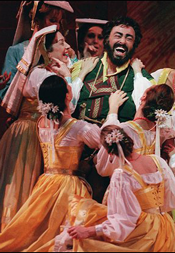
10 Sep 2007
DONIZETTI: L’elisir d’amore
L’elisir d’amore, Melodramma giocoso in two acts.
Andromaca: Dramma per musica in three acts.
Ermione: Azione tragica in two acts.
Ippolito ed Aricia: Tragedia in five acts.
Idomeneo: Opera seria in three acts.
Paride ed Elena: Dramma per musica in five acts.
Orphée: Opera in four acts.
Music composed by Christoph Willibald Gluck (arranged by Hector Berlioz, 1859). Libretto by Ranieri de' Calzabigi
Alceste, ou Le triomphe d’Alcide: Tragédie en musique in a prologue and five acts.
Alceste: Tragédie opéra in three acts.
Medea: Melodramma tragico in three acts.
Oedipe à Colone: Tragédie lyrique in three acts.
Elektra: Tragedy in one act.
Fedra: Dramma per musica in two acts.
Les Troyens: Grand opéra in five acts.
Die Meistersinger von Nürnberg: Music drama in three acts.
Ariadne auf Naxos, Oper with a prologue and one act. Music composed by Richard Strauss. Libretto by Hugo von Hofmannsthal.
Der Schauspieldirektor [The Impresario], Singspiel in one act, K486.
Divertimento teatrale in one act.
Andrea Chénier, an opera in four acts.
La figlia del reggimento [La Fille du régiment (‘The Daughter of the Regiment’)], Opéra comique in two acts.
La Bohème, opera in four acts. Music composed by Giacomo Puccini. Libretto by Giuseppe Giacosa and Luigi lllica, based on episodes from Henri Murger’s Scènes de la vie de Bohème.

L’elisir d’amore, Melodramma giocoso in two acts.
Streaming Audio
Music composed by Gaetano Donizetti. Libretto by Felice Romani derived from Le philtre (1831) by Daniel-François-Esprit Auber.
First Performance: 12 May 1832, Teatro della Canobbiana, Milan.
| Principal Characters: | |
|---|---|
| Nemorino a simple peasant | Tenor |
| Adina, a wealthy landowner | Soprano |
| Belcore, a sergeant | Baritone |
| Dr. Dulcamara, an itinerant physician | Bass |
| Giannetta, a peasant girl | Soprano |
Setting: A village.
Synopsis:
Act I
Scene 1
Nemorino, whose name accurately describes him as a“little nobody,” is smitten with the wealthy Adina, but can’t inspire love in her heart. Nemorino sees Adina reading a book in the village square and wonders how a fool like him could possibly win her love. Everyone begs Adina to tell the story, so she reads the tale of Tristan, who bought a love potion from a magician in order to win the heard-hearted Isolde. If only they knew how to get the recipe!
A drum roll signals the arrival of a platoon of soldiers headed by handsome Sergeant Belcore. Arrogantly likening himself to Paris wooing a goddess, Belcore immediately proposes to Adina, much to Nemorino’s dismay. But when Adina says she needs time to think it over, Nemorino seizes the moment and declares his undying love for her once again. Irritated, Adina declares that she is capricious and fickle—he should look for love elsewhere.
Scene 2
Dr. Dulcamara, a fast-talking quack, arrives and sings the praises of his amazing elixir, guaranteed to cure all diseases—and even chase away mice and bugs! Nemorino, who falls for the con like everybody else, asks if Dulcamara carries Isolde’s love potion. Dulcamara gives Nemorino a bottle of Bordeaux, warning him that it will only take effect after twenty-four hours (giving Dulcamara time to get away) and that he must keep it a secret. Nemorino drinks enough to get tipsy, so when Adina comes by he is so full of confidence that he pretends to ignore her. Aggravated to find her swain so oblivious, she promises to marry Belcore in six days. Nemorino isn’t worried because the elixir will be in effect the next day. But Belcore receives orders to leave the village in the morning, so Adina agrees to marry him immediately. Now that Nemorino is really desperate, Adina enjoys his torment. She invites everyone to the marriage feast, and they all mock the dunce who thought he could defeat the dashing Belcore.
Act II
Scene 1
While they’re waiting for the notary to arrive at the wedding, Dr. Dulcamara entertains everyone with a comic song. Adina, however, hesitates to continue because Nemorino isn’t there—she wants to complete her revenge. After the company goes off for the wedding toast, Nemorino sneaks in and begs Dulcamara for help. Always obliging, he prescribes another dose, but Nemorino is broke. Belcore finds Nemorino alone and talks him into signing up—what a victory to enlist your own rival! Nemorino accepts, hoping the elixir will work before he leaves with the soldiers.
Scene 2
Rumor has it that Nemorino’s uncle has died, leaving him heir to a fortune. All the girls flirt with Nemorino, who doesn’t know about the inheritance and thinks the potion is finally working. Adina is astonished at his popularity and realizes that she is jealous. When Dulcamara brags that it was his elixir that worked the miracle, Adina also learns that Nemorino has sold his freedom for her. She realizes that she is in love with him, and Nemorino is delighted to see her shed a tear on his behalf. Adina takes action, buying back the enlistment papers from Belcore and admitting to Nemorino that she loves him. When Dulcamara tells everyone about Nemorino’s inheritance, Dulcamara claims the credit—his elixir is so powerful, it can make rich men out of poor ones! As he leaves town in triumph, everyone wishes him well—except Belcore.
[Synopsis Source: Pittsburgh Opera]